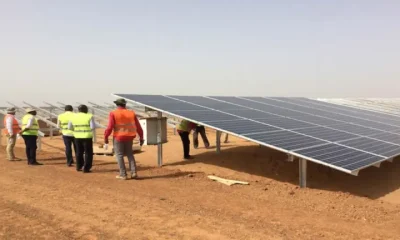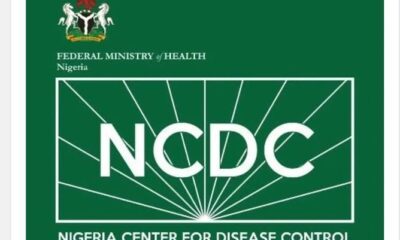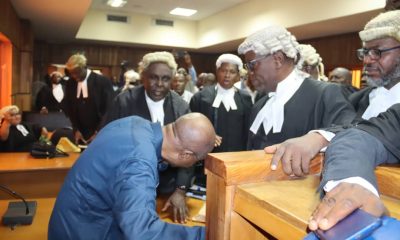News
U.S. urges INEC to address concerns ahead of March 11 polls
The U.S. has called on the Independent National Electoral Commission (INEC) to address technical hitches reportedly associated with the use of Bimodal Voter Accreditation System (BVAS) before the governorship and state assembly elections on March 11.
Ned Price, Spokesperson for the State Department, in a statement, said Nigerians were clearly within their rights to have such concerns and should have high expectations for their electoral processes in the just-concluded Presidential poll.
“We join other international observers in urging INEC to improve in the areas that need the most attention ahead of the March 11 elections.
“We understand that many Nigerians and some of the parties have expressed frustration about the manner in which the process was conducted.
“They have also expressed frustration about the shortcomings of technical elements that were used for the first time in a presidential election cycle,’’ he said.
Price, however, advised the aggrieved presidential candidates to use all legal means to correct the anomaly.
“There are well-established mechanisms in place for the adjudication of electoral disputes, and we encourage any candidate or party seeking to challenge the outcome to pursue redress through those mechanisms.
“We call on all parties, candidates, and supporters to refrain from violence or inflammatory rhetoric at this critical time,’’ the spokesperson said.
In addition, Price commended the active participation of civil society and the media for advancing electoral norms and political discourse on issues of importance to citizens.
He said the U.S. noted with concern reports that numerous members of the media were attacked during the course of the election.
“We urge the government, security forces, political actors, and all citizens to respect the media’s critical role by refraining from any damaging acts against them and ensuring accountability for such acts when they do occur.
“We also congratulate the Nigerian people, especially the large number of youths who are relatively new to the political process, for demonstrating their strong commitment to democracy.’’
According to Price, the United States congratulates the people of Nigeria, President-elect Tinubu, and all political leaders following the declaration by INEC on the results of the February 25 presidential election.
He said that the competitive election represented a new period for Nigerian politics and democracy.
“Each of the top three candidates was the leading vote-getter in 12 states, a remarkable first in Nigeria’s modern political era, reflecting the diversity of views that characterized the campaign and the wishes of Nigeria’s voters.’’
The News Agency of Nigeria (NAN) reports that the INEC Chairman, Prof. Mahmood Yakubu, on Wednesday announced that Tinubu, a former Lagos State governor and the candidate of the All Progressives Congress (APC), won the election with the majority of votes cast across Nigeria.
The APC candidate polled 8,794,726 votes to defeat fellow contenders – Atiku Abubakar of the opposition People’s Democratic Party (PDP) who polled 6,984,520 votes, Labour Party’s Peter Obi had 6,101,533 votes to come third and candidate of the New Nigeria People’s Party (NNPP), Rabiu Kwankwaso, who polled 1,496,687 votes to place a distant fourth.
Of the 36 states and FCT, Tinubu, Obi and Atiku won 12 states each while Kwankwaso won only Kano State.
The 12 states won by Tinubu are Ogun, Oyo, Osun, Kwara, Benue, Rivers, Borno, Zamfara, Jigawa, Ondo, Kogi and Niger.
Atiku of the PDP won Taraba, Osun, Akwa Ibom, Adamawa, Kaduna, Sokoto, Yobe, Bayelsa, Kebbi, Bauchi, Gombe and Katsina States.
Obi won the following states of Ebonyi, Enugu, Imo, Anambra, Abia, Delta, Edo, FCT, Plateau, Nasarawa, Lagos and Cross River.
News
Woman killed while crossing road in Anambra

The Federal Road Safety Corps (FRSC), Anambra State Sector Command, has confirmed the death of a woman in an accident at Okpoko Market on the Asaba-Onitsha Road.
The Sector Commander, Mr Adeoye Irelewuyi, who confirmed the accident to journalists in Awka on Thursday, said that the woman was hit while she was crossing the road.
He said that the accident, which occurred on Wednesday, involved a commercial tow truck with registration number XA550BMA.
“Eyewitness report reaching us indicates that the truck was towing a vehicle in an uncontrollable speed along the axis.
“The vehicle that was being towed got detached from the tow truck.
“It hit and killed a female adult, who was said to be crossing the road, while the tow truck continued its movement.
“FRSC rescue team came to the scene and took the woman to Toronto Hospital, Onitsha, where she was confirmed dead and her body deposited at the hospital’s mortuary,” he said.
While sympathising with the family of the dead, the sector commander urged motorists, especially tow truck drivers, to exercise a high level of professionalism.
He also urged the drivers to always use standard equipment and avoid speeding.
News
LASG’s maize palliative impactful, says poultry association chair

The Chairman, Poultry Association of Nigeria (PAN), Lagos State Chapter, Mr Mojeed Iyiola, said the state government’s maize palliative to members of the association made a positive impact on the sector.
Iyiola said this in an interview with the News Agency of Nigeria (NAN) on Thursday in Lagos.
“We received about 150,000 tons of maize in February from the Lagos State government as palliative to cushion the effect of high feed prices.
“The major benefit of the palliative is that it actually cushioned the cost of production for most poultry farmers in the state.
“The palliative was beneficial as it made the cost of some poultry produce, especially eggs to drop,” Iyiola said.
He noted that prior to the palliative, a crate of egg was sold between N3,500 and N3,700 at the farm gate, but after the palliative, it now sells between N3,200 and N3,400.
According to the PAN chair, retailers and middlemen who sell from N3,800 to N4,200 do that for their personal gain.
“We have urged our members to sell their eggs at reasonable prices following the receipt of the palliative from the government.
“We appreciate the Lagos State government for the palliative but we also urge the federal government to do likewise, to further reduce the cost of production in the sector.
“This will consequently lead to drop in the prices of all poultry produce across board,” he said.
He said the palliative was shared among financial members of the association at no extra cost.
“As an association we shared the grains equally across PAN’s eight zones in the state equally. We also mandated each zone not the sell even a grain of the maize.
“We, however, considered new poultry farmers who wanted to the join the association as beneficiaries of the palliative,” said Iyiola.
He noted that through the palliative, more poultry farmers were recruited into the association.
“The maize was shared only to poultry farmers and not feed millers, it is the major component of poultry feed formulation,” he said.
-

 News7 days ago
News7 days agoFG To Provide Solar Subsidy In Nigeria Through $750 Million World Bank Loan
-

 Headline7 days ago
Headline7 days agoLassa Fever Kills 150 In Nigeria — NCDC
-

 Headline7 days ago
Headline7 days agoUnknown Gunmen Abduct Channelstv Reporter In Port-harcourt
-

 News7 days ago
News7 days agoLagos Court Grants Emefiele N50m Bail
-

 News7 days ago
News7 days agoBreaking…Naira abuse: Court sentences Bobrisky to 6 months in custody
-

 Foreign7 days ago
Foreign7 days ago3 teens arrested in Germany for allegedly plotting terror attack
-

 Business17 hours ago
Business17 hours agoSeplat Energy celebrates a decade of Dual Listing with Bell Ringing Ceremony at Nigerian Stock Exchange





